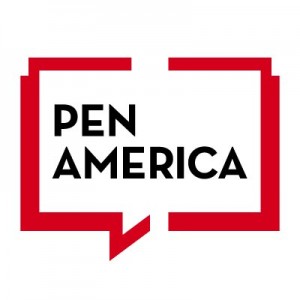 Even before the second version of President Trump’s travel ban was unveiled yesterday, the general unease over immigration restrictions and possible detention or questioning at U.S. ports of entry was already causing a chilling effect for international writers and artists considering a visit to the country, according to a statement from PEN America.
Even before the second version of President Trump’s travel ban was unveiled yesterday, the general unease over immigration restrictions and possible detention or questioning at U.S. ports of entry was already causing a chilling effect for international writers and artists considering a visit to the country, according to a statement from PEN America.
Obviously the creators most dramatically affected by both the old and new bans are those with passports from the seven (or six in the new version) Muslim-majority countries named in the executive order. For example Khalid Albaih, the Sudanese-born political cartoonist exiled in Qatar, recently told ArtNet News that he’s “not even thinking of applying for a visa” for the U.S. anytime soon, considering that even before the ban each application to visit required about six months and underwent intense scrutiny. “If that’s not extreme vetting, I don’t know what is,” he observed.
Writers, artists, and intellectuals from other countries have not escaped the border clampdown, however. In one of the most widely publicized cases Mem Fox, the 71-year-old Australian author of children’s picture books, was detained for two hours and aggressively questioned at Los Angeles International Airport. She was eventually allowed to complete her trip and later received an apology from the U.S. embassy in Australia, but says she remains troubled at the thought that “if this were happening to me, a person who is white, articulate, educated, and fluent in English, what on earth is happening to people who don’t have my power?”
Likewise, French historian Henry Rousso was detained for 10 hours at George Bush Intercontinental Airport in Houston and nearly deported because a Customs and Border Patrol officer described as “inexperienced” suspected that he intended to work illegally in the U.S., when in fact he was giving one lecture for which he had the proper visa. Rousso has long been a French citizen, but he was born in Egypt to Jewish parents before the whole family was expelled from that country due to their religion in 1956. As a historian specializing in France’s Nazi-collaborating Vichy government, Rousso was also chilled at the thought of the treatment given to other detainees:
This incident has caused me some discomfort, but I cannot stop thinking of all those who suffer these humiliations and legal violence without the protections I was able to benefit from. …How can one explain this zeal if not by the concern to fulfill quotas and justify increased controls? That is the situation today in this country. We must now face arbitrariness and incompetence at all levels. I heard recently that “Paris isn’t Paris anymore.” The United States seems no longer quite the United States.
PEN America also reports that U.S. artist Aaron Gach was recently detained and “subjected to detailed questioning regarding an art exhibition in which he had participated in Belgium, including questions about why he was invited, who invited him, and how often he takes part in such exhibits.” CPB agents pressured Gach into turning over his cellphone, which was “removed from his sight for several minutes before being returned to him.” Gach is a U.S. citizen, but non-citizens entering the country could be subject to even more scrutiny of their electronic devices and social media accounts under a Department of Homeland Security proposal which would require them to provide their passwords as a condition of entering the country. CBLDF was part of a massive coalition of human rights and civil liberties organizations, trade associations, and experts in security, technology, and the law who recently condemned that proposal in a joint statement.
In light of these stories which have quickly spread around the world, it’s hardly surprising that an increasing number of international creators are choosing to avoid these shores for the time being. Shortly after Mem Fox’s ordeal, Australian comics writer Tom Taylor made the decision not to travel to the U.S. for Emerald City Comicon or any other upcoming events. In a Facebook post, he outlined his reasoning–including that his social media accounts “shouldn’t need to be scrutinized to gain entry to a country where free-speech is so highly valued.” But as with Fox and Rousso, there was one other factor that made him most uneasy, he said:
And that’s the idea that I have nothing to worry about. The idea that I could be let in without the extra scrutiny, without incident, without a care in the world… purely because I’m a straight white guy.
I don’t want to happily visit a country that is in the process of denying entry to so many, purely because of where they were born or what they believe. And so, I won’t.
Sadly, there can be little doubt that we will hear from more creators making the same decision–or worse, having the decision taken out of their hands altogether–in the months and years to come. Whether intended or not, the immigration restrictions will have a detrimental effect on the historically vibrant multicultural creativity of the United States, says PEN:
America’s status as a world-class cultural hub, as a proponent of free thought and lively debate, as a country that celebrates our diversity and welcomes new voices and new ideas from all corners of the world, is crumbling. The image of a shining city on a hill is erased, and in its place rises a forbidding, angry, hostile country that talks of building walls and banning outsiders. We will all be poorer for it.
Help support CBLDF’s important First Amendment work in 2017 by visiting the Rewards Zone, making a donation, or becoming a member of CBLDF!
Contributing Editor Maren Williams is a reference librarian who enjoys free speech and rescue dogs.